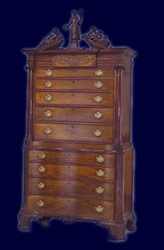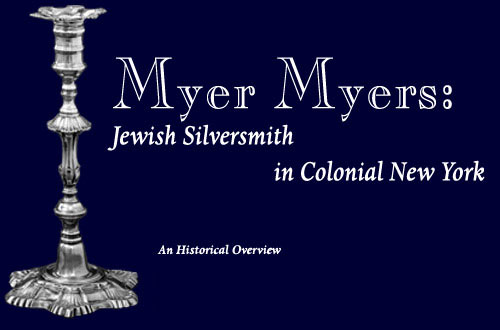 |
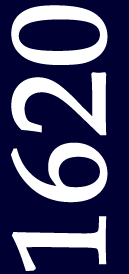
| New York City: Historical Events
1626 The Dutch West India Company, a commercial venture, founds New Amsterdam as a trading post for the fur trade along the Hudson River. American Colonies: Historical Events
1630 Founding of Boston by John Winthrop and the Massachusetts Bay Company; beginning of the "Great Migration" of Puritans from England to New England.
1632 publication of Les Voyages de Nouvelle France by Samuel de Champlain, founder of Quebec. |
| 1632 Charter for the colony of Maryland is granted to Cecilius Calvert, Lord Baltimore.
1636 Roger Williams founds Providence Plantation (now in Rhode Island), the first colony to protect religious freedom.
|
| Europe: Historical Events
1629 Charles I of England dissolves Parliament and rules alone for 11 years. 1630s Most European countries remain embroiled in the Thirty Years' War (1618-48), a destructive series of conflicts over control of different territories by Catholic or Protestant rulers; it also represented attempts by Sweden and France to curb the power of the Holy Roman Empire. 1639 England establishes a trading post at Madras, India, where Elihu Yale lives for 27 years beginning in 1672. |
| American Art and Culture
1636 Founding of the College of Massachusetts Bay in Cambridge, to be renamed Harvard College in 1639. 1640 The Bay Psalm Book, the first book printed in the English colonies in North America, is published in Cambridge.
|
| European Art and Culture
1630 Inigo Jones designs Covent Garden in London. 1632 Galileo's Dialogue on the Two Chief World Systems, a defense of the Copernican theory of the solar system, is published at Florence; the following year he is found guilty of heresy by the Inquisition. 1633 Completion of Gianlorenzo Bernini's bronze baldacchino over the altar in St. Peter's, Rome. 1637 Rene Descartes' Discours de la méthode (Discourse on Method) is published in Leyden. |
| 1642 One of the earliest modern operas, Claudio Monteverdi's L'Incoronazione di Poppea (The Coronation of Poppea), is first performed in Venice.
1642 Rembrandt paints The Night Watch (Rijksmuseum, Amsterdam).
|
| Jewish World
1624 Jews in Brazil aid Dutch attack on Portuguese and form a congregation. 1648 Chmielnicki Pogroms in Poland. |
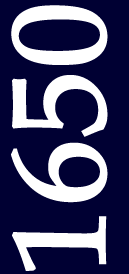
| New York City: Historical Events
1647 Pieter Stuyvesant is appointed the governor of New Netherlands. 1664 English forces capture New Amsterdam and rename the city New York. |
| American Colonies: Historical Events
1642 City of Montreal is founded. 1652 Two silversmiths, John Hull and Robert Sanderson, Jr., receive the contract from the government of Massachusetts Bay Colony to mint money for the Colony; they create the "Pine Tree shillings".
|
| Europe: Historical Events
1643 Louis XIV crowned King of France at age five; he rules for 72 years.
|
| 1648 Peace of Westphalia ends the Thirty Years' War, which established independent Protestant states of the Netherlands and Switzerland.
1649 King Charles I of England beheaded. Oliver Cromwell rules England as a Puritan Commonwealth until the Restoration of the monarchy in 1660. |
| American Art and Culture
1650 The Tenth Muse Lately Sprung Up in America, the first book of poetry written in colonial America by Anne Bradstreet of Boston, is published in London.
|
|
European Art and Culture
1651 Thomas Hobbes publishes Leviathan, in which he praises absolute monarchs, in London. 1667 John Milton publishes Paradise Lost, perhaps the greatest epic poem in the English language. |
| Jewish America
1654 A group of 23 Jews, refugees from a Portuguese takeover of Brazil, arrive and are granted permission to settle in New Amsterdam. 1654 Jacob Barsimon arrives on July 8 in New Amsterdam from Holland champion of equal rights for Jews. 1655 Asser Levy, a member of the first group of Jews to arrive in New Amsterdam wins the right to serve in the militia. |
|
1655 Dutch West India Company allows Jewish settlers to live in New Netherland. 1664 The Jews of New York obtain the right of freedom of worship from the first English governor. 1678 Jews in Rhode Island purchase land for cemetery. |
| Jewish World
1651 Sephardi Jewish Shippers in Amsterdam seek to have Jews readmitted to England. 1655 Cromwell permits Jews to settle in England; they had been expelled in 1290 by Edward I. 1655 The Jews of Isfahan Persia, are expelled or forced to convert to Islam. 1656 Baruch Spinoza excommunicated from the Sephardic Jewish community of Amsterdam for his deductive and rationalistic philosophy. He is accused of denying the divine inspiration of the Torah. |
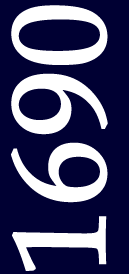
| New York City: Historical Events
1689-91 Jacob Leisler, a Protestant supporter of William III, seizes power in New York from the lieutenant governor and suppresses opposition until his defeat and execution by troops from Britain. |
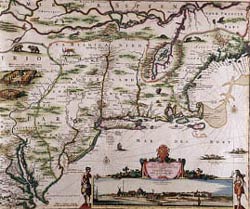
c. 1680, "Novi Belgii, Novaeque Angliae nec non Partus Virginiae Tabula" from Nicolaes Visscher's Atlas Minor, sive Geographia Compendiosa, Amsterdam, hand-colored engraving, heightened with gold. One of the earliest views of New York appears at the lower right of this map. |
| American Colonies: Historical Events
1679-82 Rene-Robert Cavelier, Sieur de la Salle, travels the Mississippi River from Illinois to the Gulf of Mexico and claims the region for France, naming it Louisiana. 1681 William Penn receives the charter for the colony of Pennsylvania and founds the city of Philadelphia. 1688 The Reverend Increase Mather of Boston travels to England to secure a new charter for Massachusetts Bay Colony from the Protestant monarchs William and Mary. 1692 Trials in Salem, Massachusetts, result in the execution of 20 people accused of witchcraft. |
| Europe: Historical Events
1680 Louis XIV revokes the Edict of Nantes, which had guaranteed Protestants freedom of worship in France. Huguenots are forced to convert to Catholicism or flee the country. 1688 Glorious Revolution in England overthrows the Catholic King, James II, in favor of his daughter Mary and her husband, William III of Orange. |
| 1714 To guarantee a Protestant succession following the death of Queen Anne, Prince George of Hanover in Germany, is crowned King George I of England.
|
| American Art and Culture
c. 1680 The original house of Thomas Morris, with stone end walls, is constructed in what is now the Morris Cove section of New Haven. Burned by the British in 1779 and later much altered, it is now the oldest house in the city, property of the New Haven Colony Historical Society. 1682 Mary Rowlandson's The Soveraignty & Goodness of God, Together with the Faithfulness of His Promises Displayed; Being a Narrative of the Captivity and Restoration of Mrs. Mary Rowlandson, describing her captivity by Indians during King Philip's War, is published in Cambridge; it becomes the first of a series of "captivity narratives". |
1693 College of William and Mary founded in Williamsburg, Virginia.
1701 Collegiate School is founded in Branford, Connecticut. It moves to New Haven in 1716 and is renamed Yale College in 1718. |
| European Art and Culture
1675-1710 Sir Christopher Wren's design for St. Paul's Cathedral, the masterpiece of English baroque architecture, is built in London. 1678 The first part of John Bunyan's The Pilgrim's Progress from This World to That Which Is to Come is published in London; for the ensuing 200 years it is the most widely read book in English after the Bible. 1684 The Galerie des glaces (Hall of Mirrors) is completed at Versailles, the palace of Louis XIV, which becomes the epitome of the formal, symmetrical, and luxurious style today known as Baroque. |
| 1687 Isaac Newton's Philosophiae Naturalis Principia Mathematica, the cornerstone of modern physics, is published in England.
1689 Henry Purcell's opera, Dido and Aeneas, is first performed. 1689 John Locke's Essay Concerning Human Understanding, which inspired Thomas Jefferson, is published in England. |
| Jewish America
1705 The New York Jewish community contributes to the building of the steeple for Trinity Church. |
| Jewish World
1673 Jews are permitted to settle in Denmark. 1673 Wave of persecutions against the Jews of Yemen. 1715 Glueckel of Hameln (1645-1724) completes writing her memoirs which describe 17th—18th century life in Germany. |
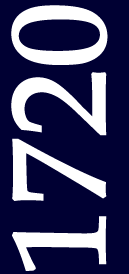
| New York City: Historical Events
1725 The first newspaper in New York, New-York Gazette, is published by William Bradford. 1735 Acquittal in New York of John Peter Zenger, publisher of the New-York Weekly Journal, who had been sued by the government for "seditious libel." His acquittal reinforces the freedom of the press. American Colonies: Historical Events
|
1734-35 The Reverend Jonathan Edwards of Northampton, Massachusetts, preaches a series of sermons that lead to the first Great Awakening, a religious revival of Puritan orthodoxy; the movement gains further momentum with the arrival of the Methodist preacher George Whitefield in 1740. |
| Europe: Historical Events
1723 End of the Regency in France and accession of King Louis XV. 1727 George II crowned King of England; he is the last British monarch to lead troops in battle, at the Battle of Dettingen in Bavaria during the War of the Austrian Succession. |
| American Art and Culture
1728 Peter Pelham creates the first mezzotint print in the American colonies, a portrait of Cotton Mather. 1729 John Smibert, a Scottish artist trained in London, travels to Boston and paints the first group portrait in America, Dean George Berkeley and His Entourage.
|
| 1731 Benjamin Franklin founds the Library Company of Philadelphia, the first circulating library in the colonies.
1736 German organist Charles Theodore Pachelbel performs concerts in New York City. 1738 The Reverend Thomas Clap, President of Yale, introduces astronomy and natural science in the curriculum. |
| European Art and Culture
1724 Johann Sebastian Bach's Saint Matthew Passion is first performed at St. Thomas's Church in Leipzig. 1725 Antonio Vivaldi's Il Cimento dell'Armonia e dell'Inventione, which includes his violin concerti called The Four Seasons, is published in Venice. 1725 Richard Boyle, Earl of Burlington, designs and begins construction of his villa at Chiswick, England, the masterpiece of English Palladian architecture. |
| 1726 Jonathan Swift's Travels into Several Remote Nations of the World, more popularly known as Gulliver's Travels, is published anonymously in London.
1730-35 Jean-Baptiste Pater (1695-1736), Scene in a Park, France, oil on canvas. YUAG, Gift of Mrs. Andre Blumenthal, in memory of her mother Annie C. Westheimer. 1731 The English naturalist Mark Catesby publishes The Natural History of Carolina, Florida, and the Bahama Islands in London. |
| Jewish America
1723 Myer Myers is born in New York, the eldest son of Solomon and Judith Myers. His father is a merchant and also serves as the sochet, or ritual slaughterer, for the Jewish community. 1730 Congregation Shearith Israel in New York, including Myer Myers's father, constructs the first synagogue building in North America on Mill Street (now South William Street). |
| 1738 The Plantation Act is passed by the English Parliament, which permits the naturalization of immigrants to the American colonies, including Jews, after seven years of residence.
Jewish World
1736 The Ba'al Shem Tov founds the Hasidic movement in eastern Europe.
1738 Czarina Elizabeth Petovna orders all Jews deported from the entire Russian Empire. |
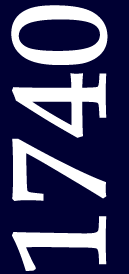
| American Colonies: Historical Events
1741 Danish explorer Captain Vitus Bering discovers Alaska. 1744 Iriquois Confederacy turns over to Great Britain lands north of the Ohio River. 1744 King George's War, the Colonial version of the War of the Austrian Succession, breaks out between English and French colonies. 1745 New England troops capture the French Fortress of Louisburg on Cape Breton Island, the first major military victory by Colonial forces. |
| Europe: Historical Events
1740 Maria Theresa becomes Empress of Austria upon the death of her father, setting off the War of the Austrian Succession, which pitted Austria, England, and the Netherlands against France and Prussia. 1746 Forces supporting "Bonnie Prince Charlie," the grandson of James II, are defeated at the Battle of Culloden in Scotland, ending Jacobite hopes of restoring a Catholic monarchy in Britain. |
| American Art and Culture
1749 The London-trained portrait painter John Wollaston arrives in New York, where he stays for three years and paints many portraits of the local gentry. 1749 King's Chapel is built in Boston, designed by Peter Harrison. European Art and Culture
|
1742 Georg Friedrich Handel's Messiah is first performed in London on Good Friday.
1749 Henry Fielding's novel, The History of Tom Jones, a Foundling, is published in London. |
| Jewish America
1740 Kahal Kodish Mikveh Israel in Philadelphia dedicates land for a cemetery. 1745 Jews in Charleston, South Carolina found Congregation Kahal Kadosh Beth Elohim. 1746 At age 23, Myer Myers appears before the Mayor's Court and is sworn and registered as a Freeman of the City; he gives his profession as "goldsmith." |
|
Jewish World 1740 Israel Ba'al Shem Tov, moves himslf at Medzibezh, Poland and establishes the Hasidic movement. 1744 Jews are expelled from Prague by Queen Maria Theresa. 1745 Frederick II of Prussia issues a charter dividing Jews according to their economic value to the state. |
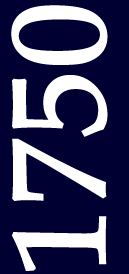
| New York City: Historical Events
1754 King's College, the first Anglican college in the northeast, is founded in New York with the Reverend Samuel Johnson as its first president. 1756 New York serves as the headquarters of the British army during the Seven Years' War. |
| American Colonies: Historical Events
1756 Outbreak of the French and Indian War, the Colonial version of the Seven Years' War, over disputed land claims in the Ohio Territory. Europe: Historical Events
1757 Robert Clive, commander of a military force of the British East India Company, defeats the Nawab of Bengal and becomes Governor, effectively giving Britain control over India. |
| 1751 Benjamin Franklin publishes Experiments and Observations on Electricity in Philadelphia.
1758 Benjamin West of Philadelphia paints his self-portrait as a watercolor miniature on ivory, the earliest extant work in this medium by an American artist.
|
| European Art and Culture
1751 The first volume of the Encyclopedie by Denis Diderot is published in Amsterdam. 1753 Carolus Linneaus publishes Species Plantarum in Sweden, which establishes the current system of binomial Latin taxonomy for living things. 1755 Dr. Samuel Johnson's Dictionary of the English Language is published in London. |
| 1754 Thomas Chippendale publishes in London the first edition of The Gentleman and Cabinet Maker's Director, a collection of furniture designs in the "Gothick, Chinese, and modern Tastes.".
|
| 1755 Johann Joachim Winckelmann publishes the essay Gedanken Uber die Nachahmung der greichischen Werke in der Malerei und Bildhauerkunst (On the Imitation of the Painting and Sculpture of the Greeks), one of the seminal texts of Neoclassicism.
Jewish America
|
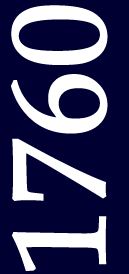
| New York City: Historical Events
1765 Parliament passes the Stamp Act, requiring a tax on seals for legal documents, licenses, contracts, newspapers and pamphlets. 1765 The Stamp Act Congress, an assembly of delegates from nine American colonies in response to the Stamp Act, convenes in New York City. 1767 The New York Assembly, the elected representatives of voting citizens, is suspended by the Royal Governor for failing to comply with the Quartering Act, which required the colonies to house and supply British troops. |
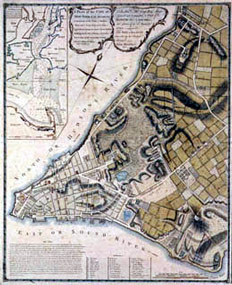
John Montresor (1736-1799) A Plan of the City of New-York & Its environs, 1766. |
| American Colonies: Historical Events
1766 The Mason-Dixon line is established as the boundary between Pennsylvania and Maryland. 1766 Stamp Act of 1765 is repealed and is succeeded by the Townshend Duties, which taxes a wider range of goods. 1767 Daniel Boone begins exploration west of the Allegheny Mountains. |
| 1767 The first Non-Importation Agreement, affecting goods from Britain as well as British colonies in the West Indies, is adopted by American merchants.
Europe: Historical Events
1762 Catherine II "the Great," succeeds as Tsarina of Russia following the murder of her husband.
1768 Civil war breaks out in Poland, and Russian troops invade the country. |
| American Art and Culture
1761 The Complete Housewife, the first American cookbook, is published in New York. 1763 Henry Wilhelm Stiegel establishes a glass manufactory at Manheim, Pennsylvania.
|
| 1768 Benjamin West exhibits Agrippina Landing at Brundisium with the Ashes of Germanicus at the inaugural exhibition of the Royal Academy in London.
1768 Paul Revere, Jr. of Boston makes the "Liberty Bowl," a silver punch bowl honoring members of the Massachusetts House of Representatives who opposed the Townshend Acts. |
| European Art and Culture
1762 Jean-Jacques Rousseau's Du Contract Social (The Social Contract) is published in Amsterdam; it begins with the words "Man is born free, and everywhere he is in chains.".
|
| 1763 Josiah Wedgwood perfects a cream-colored earthenware that becomes extremely popular and makes his fortune; after he makes a set for Queen Charlotte in 1766, he renames it "Queen's ware".
|
| 1765 James Watt perfects the steam engine
1765 Sir William Blackstone publishes the first volume of Commentaries on the Laws of England, the foundation of modern legal education. 1768 The Royal Academy is founded in London, with Sir Joshua Reynolds as its first President. |
| Jewish America
1763 The Touro Synagogue in Newport, designed by Peter Harrison, is dedicated; it is the only surviving American synagogue building from the eighteenth century.
1765 Ten Jews sign non-Importation Acts of Pennsylvania. |
| 1765 The first book of Jewish prayers to be printed in English, Prayers for Shabbath, Rosh-hashanah, and Kippur, is published in New York in a translation by Isaac Pinto.
|
| Jewish World
1764 The Council of Four Lands is abolished in Poland ending recognition of Jewish centralized institutions that has existed for almost 200 years.
1768 John Caspar Lavater, Swiss clergyman, challenges Jewish philosopher Moses Mendelssohn to defend the superiority of Judaism to Christianity. Mendelssohn declines because of his belief in religious tolerance and to do so would be imprudent. |
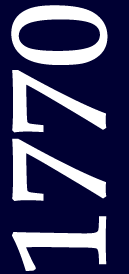
| New York City: Historical Events
1776 Within a week of the announcement of independence, a mob in New York destroys the lead statue of George III on Bowling Green. 1776 General William Howe defeats George Washington's forces in the Battle of Brooklyn and captures New York City, which the British occupy for the duration of the Revolutionary War. 1776 Nathan Hale, Yale class of 1773, is captured behind British lines in occupied New York and hanged as a spy at a site near present-day Third Avenue and 66th Street. |
| American Colonies: Historical Events
1770 The "Bloody Massacre" in Boston occurs when British troops fire on a mob protesting the Townshend and Quartering Acts.
|
| 1771 At the Battle of Alamance, Governor William Tryon of North Carolina uses British troops to defeat the Regulators, a rebellion of backcountry farmers protesting repressive taxation and lack of representation in the state assembly. Myers's patron Samuel Cornell, a supporter of Tryon, is wounded.
1773 Boston Tea Party takes place, in which a group of patriots dressed as Indians dump cargoes of taxed tea into the harbor. 1774 "Mother" Ann Lee establishes the first community of the United Society of Believers in Christ's Second Coming, popularly known as "Shakers," at Watervliet, New York. |
| 1776 Declaration of Independence is adopted and signed in Philadelphia by the Second Continental Congress.
|
| Europe: Historical Events
1770 James Cook, on his first voyage, lands at Botany Bay and claims Australia for England. 1770 Lord North becomes Prime Minister of Great Britain and pursues the policies of George III to tax and subdue the American colonies. 1772 Poland loses about one-third of its territory in the First Partition between Russia, Prussia, and Austria. 1774 Louis XVI crowned King of France; four years later, his government makes a formal military alliance with the United States. |
| 1778 On his third voyage, James Cook discovers the Hawaiian Islands.
American Art and Culture
|
| 1771 The American Philosophical Society in Philadelphia publishes the first volume of its Transactions.
1771 John Singleton Copley, Boston's pre-eminent portrait painter, arrives in New York, where he paints about twenty portraits in six months. 1778 The Reverend Ezra Stiles is appointed President of Yale College and institutes the mandatory study of Hebrew by undergraduates. |
| European Art and Culture
1771 Sir Joshua Reynolds, Miss Abington as Miss Prue, London, oil on canvas. Yale Center for British Art.
1774 Joseph Priestly discovers the element of oxygen, which he calls "dephlogisticated air."
1774 Johann Wolfgang von Goethe publishes The Sorrows of Young Werther, a novel that is one of the earliest statements of Romanticism. |
| 1775 Richard Brinsley Sheridan's comedy The Rivals is first performed in London.
1776 Adam Smith's An Inquiry into the Nature and Causes of the Wealth of Nations, the cornerstone of modern economics, is published in England. 1776 Historian Edward Gibbon publishes the first of six volumes of his monumental The History of the Decline and Fall of the Roman Empire. |
| Jewish America
1773 Rabbi Raphael Hayyim Isaac Carigal who has come from Palestine preaches a sermon in the Touro Synagogue. While in Newport, he becomes friendly with Ezra Stiles, later to become the president of Yale University.
|
| 1775 Frances Salvador is elected as a delegate to the South Carolina Provincial Congresses of 1775 and 1776, the first Jew to hold elective office in America. In 1776, he was the first Jew to die in the American Revolutionary War.
1776 Jews in New York flee the city as the British army advances. |
Click here to see 3-D view of Dish Ring. (Requires QuictTime) |
| 1778 Mordecai Sheftall, Commisionary General of the Georgia militia, is captured in the battle of Savannah.
Jewish World
|

| New York City: Historical Events
1783 General George Washington bids farewell to his officers at Fraunces Tavern, still standing at 54 Pearl Street.
|
1785 Empress of China, the first American vessel to sail to Canton, returns to New York with a cargo of tea, silk, and porcelain.
1789 George Washington is inaugurated as the first President of the United States. |
| United States: Historical Events
1781 British General Thomas Cornwallis surrenders to Washington at Yorktown, Virginia, ending the Revolutionary War.
|
| 1783 The Treaty of Paris is signed, formally recognizing the United States as an independent nation.
1787 Constitutional Convention meets in Philadelphia; the Constitution is ratified by a majority of the states in the following year. Europe: Historical Events
|
|
1789 The Estates-General, a meeting of representatives of the nobility, clergy, and common people, is convened by Louis XVI at Versailles. The Third Estate declares itself the National Assembly and demands a constitution. Bastille fortress in Paris is stormed by a mob, signaling the beginning of the French Revolution.
1789 French Revolution. In August, the Declaration of the Rights of Man, which prefaces the French Constitution, is adopted by the revolutionary National Assembly, and states that no man ought to be "disturbed" because of his religious beliefs. |
| American Art and Culture
1782 Gilbert Stuart exhibits The Skater, a portrait of William Grant, at the Royal Academy in London; it creates a sensation and makes him a popular portrait painter.
|
1785 Thomas Jefferson designs the State Capitol of Virginia, based on a Roman temple in Nimes, France. |
| European Art and Culture
1781 Immanuel Kant's Critik den reinen Vernunft (Critique of Pure Reason) is published in Riga. 1784 Pierre Augustin Beaumarchais writes the play Le mariage de Figaro (The Marriage of Figaro), which satirizes the aristocratic system and its outmoded privileges. 1788 Wolfgang Amadeus Mozart composes his last three symphonies, nos. 39-41. 1788 George Hepplewhite's The Cabinet Maker and Upholsterer's Guide, a collection of 300 furniture designs in the neoclassical style, is published posthumously in London. |
| Jewish America
1781 Haym Salomon, who arrived from Poland in 1772 assists Robert Morris, superintendent of finance, in raising funds to finance the patriot cause in the Revolutionary War. 1782 David Salisbury Franks, a Revolutionary War officer is appointed vice-consul in Marseilles. He is the first Jew to be appointed to a U.S. diplomatic post. 1784 Myer Myers and three other Jews representing Congregation Shearith Israel present an address to General George Clinton, the new Governor of New York. |
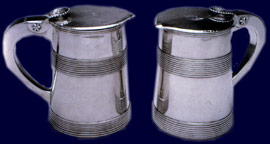
1784-85 Myer Myers, Pair of Tankards, Silver |
| 1789 George Washington in replying to letters of congratulation sent by Jewish congregations from Philadelphia, New York, Charleston and Richmond, on his election to the presidency stresses his belief in religious freedom. His letter to the Newport congregation includes the phrase "To bigotry no sanction."
1789 Gershom mendes Seixas, minister of New York's Jewish congregation, is invited to Washington's inaugural. Jewish World
|
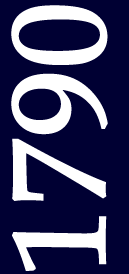
| United States: Historical Events
1790 John Carroll is appointed bishop of Baltimore, the first Catholic see in the United States. 1792 Bill of Rights adopted. 1796 John Adams is elected the second President of the United States. |
| Europe: Historical Events
1793 The Reign of Terror in France, as radical Jacobins, led by Maximilien Robespierre, seize control of the government. The monarchy is abolished, and Louis XVI and Marie-Antoinette are guillotined in Paris. 1795 British troops capture Ceylon (now Sri Lanka) from Dutch control. 1798 General Napoleon captures Malta, Alexandria, and Cairo; Admiral Horatio Nelson defeats the French navy in Abukir Bay. 1799 Napoleon takes control of the government of France as First Consul in a coup d'etat. |
| American Art and Culture
|
| 1793 Gilbert Stuart returns to the United States after living abroad for 16 years.
1793 Samuel Slater opens his first cotton mill in Pawtucket, Rhode Island. 1793 Eli Whitney of New Haven, Connecticut, applies for a patent on the cotton gin, one of the first major American inventions of the Industrial Revolution. |
| European Art and Culture
1791 Thomas Sheraton publishes the first of four volumes of The Cabinet Maker and Upholsterers' Drawing Book in London. 1792 Mary Wollstonecraft's A Vindication of the Rights of Woman is published in England, a plea for equality of education and opportunity for women. |
| 1795 Franz Joseph Haydn's last symphony, no. 104, is first performed at the King's Theatre in London.
1798 Thomas Malthus publishes An Essay on the Principle of Population in London. 1798 Samuel Taylor Coleridge and William Wordsworth publish Lyrical Ballads, a collection of poems that is one of the earliest works of Romanticism in England. |
| Jewish America
1795 Myer Myers dies at age 72.
1795 A group of Ashkenazi Jews break away from Mikveh Israel synagogue in Philadelphia and form Rodeph Shalom, the first Ashkenazi synagogue in N. America. |
| Jewish World
1791 French Genral Assembly grants all Jews full emancipation. 1791 Czarina Catherine the Great limits economic rights granted to Jews only to Jews living in newly conquered territory. 1792 Daniel Mendoza becomes English boxing champion. |
| 1795 Adas Jeshurun, the first Reform synagogue in Europe is established in Amsterdam.
1796 Shneur Zalman, founder of Habad of Lyady publishes Tanya. 1796 French Revolutionary Army expells Pope from Rome and bring temporary emancipation to Jews of Italy. 1799 Italian Jews forced to return to Ghettos and restrictions because of restoration of old rulers. 1799 First case of blood libel inn Russia occurs, when a group of Jews are accused of sacrificing a non-Jewish child for Passover. The accused are later released. |
| Credits
Editorial: Yale University Art Gallery, Grace Cohen Grossman, Tamar Yacov
Design and Producton: David Greenfield
Unless noted, all objects are from the Yale University Art Gallery and Yale University Libraries. |
| Material in this timeline has been drawn from Bernard Bailyn et al.,The Great Republic: A History of the American People (Boston: Little, Brown, 1977); Laurence Urdang, ed., The Timetables of American History (New York: Simon and Schuster, 1996), and Judah Gribetz with Edward L. Greenstein and Regina S. Stein, The Timetables of Jewish History (Boston: Simon and Schuster, 1993). Visitors may consult these sources for further information. |
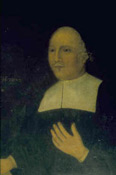
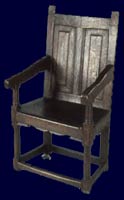
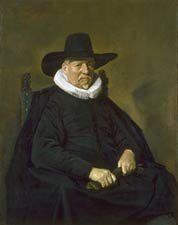
 1667–74, John Hull (1624-1683) and Robert Sanderson (1608-1693), Pine Tree Shilling, Boston, silver.
1667–74, John Hull (1624-1683) and Robert Sanderson (1608-1693), Pine Tree Shilling, Boston, silver.
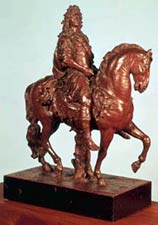
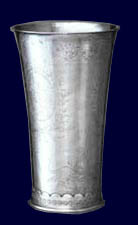
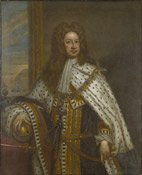 c. 1705, Studio of Godfrey Kneller (1646-1723), King George I, England, oil on canvas.
c. 1705, Studio of Godfrey Kneller (1646-1723), King George I, England, oil on canvas.
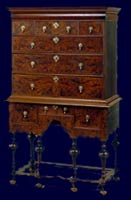 1700-20 High Chest of Drawers, Boston or New York, walnut veneer and a burl veneer on eastern white pine, walnut, soft maple, aspen, chestnut.
1700-20 High Chest of Drawers, Boston or New York, walnut veneer and a burl veneer on eastern white pine, walnut, soft maple, aspen, chestnut. 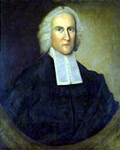
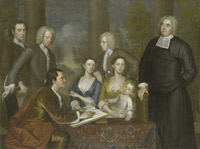
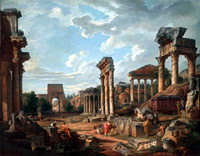
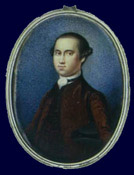
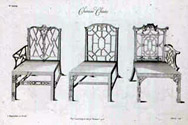
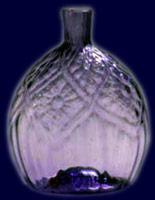 1767-74 Henry Wilhelm Stiegel, Flask, Manheim, Pennsylvania, blown pattern-molded lead glass.
1767-74 Henry Wilhelm Stiegel, Flask, Manheim, Pennsylvania, blown pattern-molded lead glass.

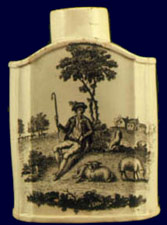 c. 1770 Josiah Wedgwood (1730-1795), Tea Caddy, Stoke-on-Trent, creamware.
c. 1770 Josiah Wedgwood (1730-1795), Tea Caddy, Stoke-on-Trent, creamware.
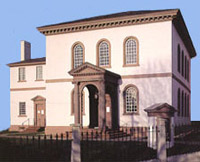
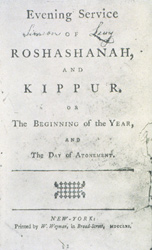
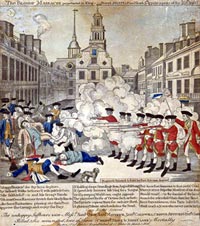
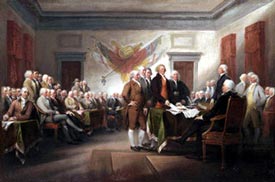
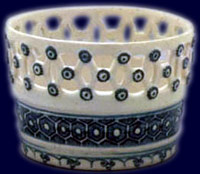 1770-72 American China Manufactory, Basket, Philadelphia, soft-paste porcelain.
1770-72 American China Manufactory, Basket, Philadelphia, soft-paste porcelain.
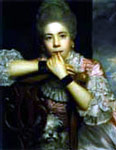
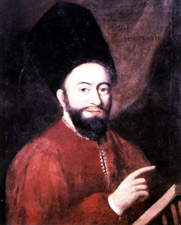 1782 Samuel King, Rabbi Haim Isaac Carigal, Oil on canvas.
1782 Samuel King, Rabbi Haim Isaac Carigal, Oil on canvas.
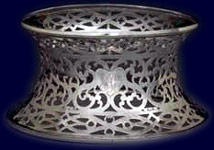 1770-76, Myer Myers (1723-1795), Dish Ring, New York, silver.
1770-76, Myer Myers (1723-1795), Dish Ring, New York, silver.
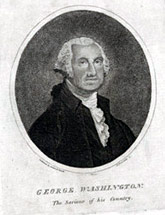 c. 1790 Amos B. Doolittle (1754-1832), George Washington, the Saviour of his Country, engraving.
c. 1790 Amos B. Doolittle (1754-1832), George Washington, the Saviour of his Country, engraving.
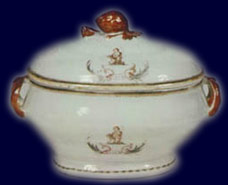

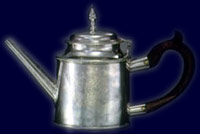 1782-85, Paul Revere, Jr. (1735-1818), Teapot, Boston, silver with wood handle.
1782-85, Paul Revere, Jr. (1735-1818), Teapot, Boston, silver with wood handle.

